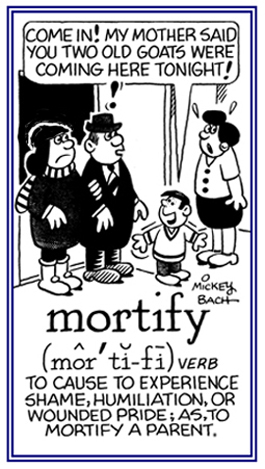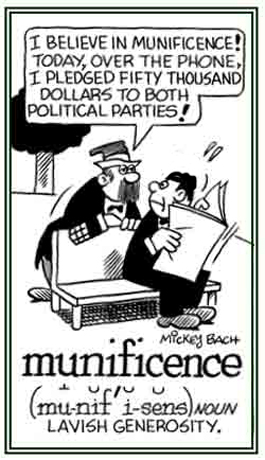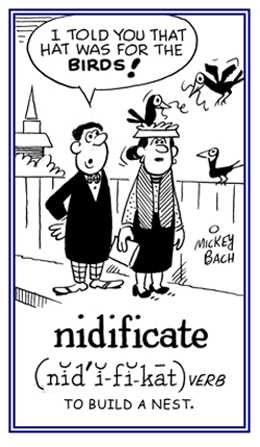fac-, facil-, fact-, feas-, -feat, -fect, -feit, -facient, -faction, -fic-, -fy, -ficate, -fication
(Latin: to make, to do, to build, to cause, to produce; forming, shaping)
2. To make someone feel ashamed and humiliated either on purpose or by accident: After Tom went to the barber shop and got his hair died green, he mortified his mother when he went to visit her at work!
3. To use self-imposed discipline, hardship, abstinence from pleasure: Self-inflicted pain is used to mortify an attempt to control or to put an end to one's desires and passions; especially, for religious purposes.

Go to this Word A Day Revisited Index
so you can see more of Mickey Bach's cartoons.
2. Etymology: from Middle French munificence, from Latin munificentia, from stem of munificus, "generous, bountiful, liberal"; literally, "present-making", from munus, muneris, "gift" or "service, duty, office" + the stem of facere, "to do".


Go to this Word A Day Revisited Index
so you can see more of Mickey Bach's cartoons.
2. Characterized by generosity.
2. Liberally; generously.
The nidificant habit of the sparrows seem to be to return to the previous year's habitation and repair it in time for the new breeding season.
Some spiders nidificate underground in order to protect their lodgings.
Some birds make a more or less extensive use of saliva as a cement in order to nidificate mud dwellings; such as, swallows, South American oven birds, and flamingos.
The use of salivary glands to nidificate their nesting places is done generally by swifts which glue small twigs to the inside of a chimney to form a tiny basket; or, as in the case of the Asiatic edible swifts, they just use saliva without twigs or anything else. Such places are harvested early in the nest-building season and used by some Chinese when they make "bird's nest soup".
2. Etymology: from Latin nidificare, "to make into a nest".
Go to this Word A Day Revisited Index
so you can see more of Mickey Bach's cartoons.
The phrase "for the birds" also means something that is "worthless", "useless", or "undesirable".
The term nidification is used in zoology and involves all the preparations for the reception of eggs or newborn animals and for their care.
Smaller species of birds provide more elaborate nidifications; such as, the abodes in hedgerows or bushes, or even on the ground where bowl-shaped structures are made of fine grass that is interwoven with horsehairs and moss or lichen so the refuges are not easy to see.
The thrushes use a foundation of clay and line the insides of their domiciles with a mixture of decayed wood and cow dung.
2. Etymology: from Latin nidus, "nest" + facere, "to make".

